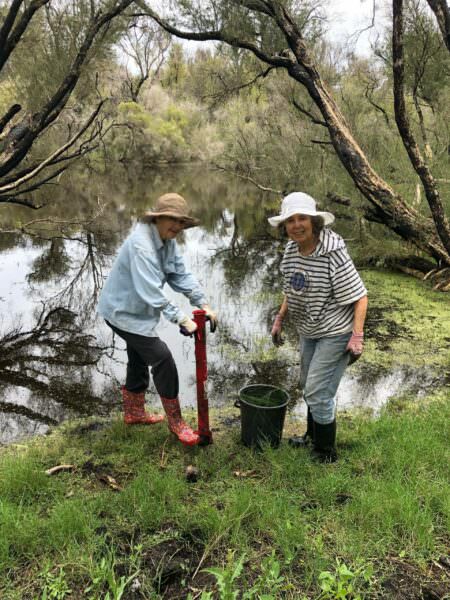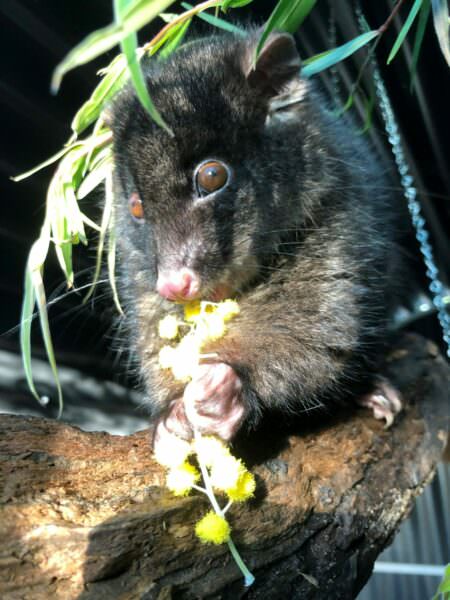While COVID-19 restrictions sometimes made it difficult, the three Western Australian groups that received 2019/20 AGIG (Australian Gas Infrastructure Group) Landcare Grants of up to $10,000 each were recently able to complete their projects and report impressive environmental outcomes.
The projects, focusing on protecting threatened and endangered species, ranged from restoring habitat for the Western Australian priority species Quenda (a sub-species of the Southern Brown Bandicoot) and the Western Brush Wallaby to restoring the bore water supply for Western Ringtail Possums at the world’s first Possum Finishing School.
Folly Wetland Fauna Habitat Project
The Waterbird Conservation Group’s project has helped restore habitat for Western Australian priority species Quenda (a sub-species of the Southern Brown Bandicoot), Blue-billed duck and Rakali (commonly known as water rats) on the banks of the Folly Wetland in Baldvis, near Rockingham.
They achieved this by increasing vegetation through planting over 7,000 seedlings to help recover the fauna habitat burnt in a June 2019 fire. Dense shrubby understorey was created on the wetland’s banks through planting native sedges, rushes, shrubs and small trees.
In addition to over 20 adult volunteers who assisted with planting and weeding over the course of the project, 10 students and two teachers from Baldivis Secondary College helped with planting some plants grown by students in the college nursery. This activity established a valuable connection between the Waterbird Conservation Group and the local student community and helped the students gain a meaningful, hands-on connection with nature.

Bev McMahon (L) and Joan Payne (R) two of the 20 volunteers from the Waterbird Conservation Group who planted native plants on the banks of the Folly Wetland. Joan is one of the Group’s founding members and is the current President.
Possum Finishing School Water Supply Project
In 2019, FAWNA (Fostering and Assistance for Wildlife Needing Aid) established the world’s first Possum Finishing School for hand reared orphaned or abandoned critically endangered Western Ringtail Possums found on the SWAN Coastal Plane from Dawesville to Manjimup. The School currently holds 20 sub-adult possums undergoing conditioning and assessments to prepare for a radio collared release to a pre-prepared site.
FAWNA used their AGIG Landcare Grant to restore the bore water supply to the site and collect rainwater from the shed roof with storage in two tanks, one potable and one not. The water collection enables them to maintain foliage feed, allows for possum and volunteer consumption, aids cleaning and sterilising pre-release aviaries and equipment and ensures the Possum Finishing School can provide a hygienic and safe working environment.
A FAWNA spokesperson commented, “Restoring the bore water supply greatly assists our Possum Finishing School to proceed for the next few years of the study and allows us to plan for future directions that were previously not possible.”

One of the 20 Western Ringtailed Possums at the Possum Finishing School
Protection of Critical Habitat of Threatened and Priority Species
The Ellen Brockman Integrated Catchment Group’s AGIG Landcare Grant project was to help protect the critical habitat of the orchid (Caladenia heuglii), protection of the priority species Quenda, (Isoodon obesulus) and Western Brush Wallaby (Macropus irma), a species whose numbers are declining in Maralla Nature Reserve.
The AGIG Landcare Grant helped them achieve this by funding the purchase of traps and surveillance cameras. This allowed the group to monitor and remove feral animals including pigs, foxes, rabbits and cats that were threats to the wildlife and critical habitat by trapping.
Another aim of the project was to document the activity of animals that use a fauna bridge over the Perth Darwin Highway and the behaviour of feral animals in response to the fauna movement. The surveillance cameras captured native animals (Emus, Kangaroos, Echidnas) using the newly opened wildlife bridge constructed over the new Tonkin Highway Extension. This was a first for Perth.